Tuesday marked the second anniversary of the fall of Kabul, certainly the worst of President Joe Biden’s unforced errors in foreign policy and arguably among the worst in the history of the American presidency.
Any list of Biden debacles must begin with Afghanistan, but there are plenty of others. They tend to repeat the Afghanistan pattern of shocking ineptitude at the highest levels of the administration coupled with absolute zero accountability.
Afghanistan

In this Aug. 15, 2021 file photo, Taliban fighters take control of the Afghan presidential palace in Kabul, Afghanistan, after President Ashraf Ghani fled the country. (AP Photo/Zabi Karimi, File)
Biden’s bungle of the Afghanistan withdrawal was a disaster of epic proportions. We might cut this administration a little slack by remembering that all of Biden’s predecessors over the past 20 years also had wildly inaccurate expectations of how hard the Afghan military would fight.
Biden was the president who got to learn the hard way that $83 billion of American taxpayer dollars and years of top-shelf American training had produced an Afghan National Defense and Security Force (ANDSF) that simply melted away before the Taliban’s blitzkrieg, allowing the Islamist insurgents to seize the entire country in exactly ten days. Two years of post-mortems have revealed the ANDSF was riddled with corruption and poor leadership. Some of its lavishly-funded units simply did not exist. The Biden administration was no more interested in taking a hard look at these problems than its three predecessors.
Biden, however, is directly responsible for ordering a hasty and incredibly clumsy withdrawal of American forces — after extending the war beyond the May 1, 2021, deadline — that took both the Afghan military and European allies by surprise. ANDSF forces that were already struggling to hold the Taliban at bay collapsed when they realized how quickly the U.S. was departing. Vital strategic positions that could have been held longer to slow the Taliban advance were abruptly surrendered.
Even Biden’s own State Department produced an “after-action review” that blamed Biden’s frenzied and chaotic withdrawal for creating panic and leaving tens of thousands of Afghans at the mercy of Taliban killers. Of course, the State Department did not drop that blistering report until June 2023, long after Biden-friendly media dismissed the Afghanistan debacle as old news, and the report threw some blame at Biden’s predecessor Donald Trump for initiating the withdrawal process during his term.
Once the Taliban reached the gates of Kabul, Biden’s horrendous errors multiplied rapidly. An almost incomprehensible decision to entrust the Taliban with airport security led to the deaths of 13 American service members and over a hundred Afghans when a bomb was detonated at the packed Kabul airport. Biden and his team panicked and ordered a “retaliatory strike” against “terrorists” that killed an innocent Kabul family, including children.
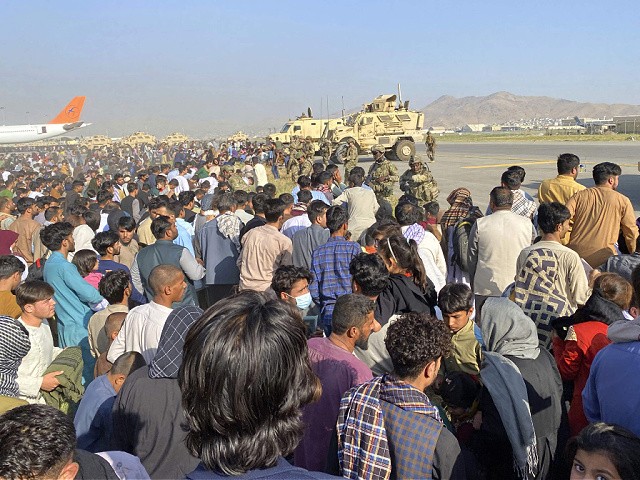
U.S. soldiers stand guard along a perimeter at the international airport in Kabul, Afghanistan, Monday, Aug. 16, 2021. (AP Photo/Shekib Rahmani)
In the aftermath of the withdrawal, auditors documented billions of dollars in American military equipment left behind and seized by the Taliban. The new Islamic Emirate of Afghanistan enjoys holding military parades using the American fighting vehicles Biden gave them.
No one has ever been held accountable for any of this, least of all Joe Biden. The Afghanistan disaster sent an unmistakable signal to America’s enemies that the Biden administration could not handle a foreign policy crisis — and felt no urgent need to get better since no one would ever have to face the music for catastrophic lapses in judgment.
Ukraine

Ukrainian State Emergency Service firefighters clear the rubble at the building which was destroyed by a Russian attack in Kryvyi Rih, Ukraine, Friday, Dec. 16, 2022. (AP Photo/Evgeniy Maloletka)
The second big foreign policy headline of the Biden administration is the Russian invasion of Ukraine. Biden’s defenders give him credit for holding together an Atlantic alliance and shipping vast amounts of money and hardware to Ukraine. His critics note Biden is not the leader of the alliance against Russia in any meaningful sense, the amount of money and material he sent to Ukraine could be a bit too vast, and not much in the way of accountability is attached to that support.
A group of Republican senators noted in July that Biden’s $113 billion in security assistance to Ukraine included $6.2 billion in unexplained “valuation errors,” which they saw as a “creative accounting” scam to “bypass Congress for additional funds, while continuing to prioritize Ukraine over more vital U.S. interests, including deterring China in the Pacific.”
Russian leader Vladimir Putin clearly overestimated his ability to seize Ukraine by storm, but the Biden team equally underestimated Russia’s ability to persevere despite heavy economic sanctions and international isolation.
Russia’s oil sales flourished as Moscow found new customers and schemes to avoid sanctions. Russia’s currency finally slipped below the important threshold of 100 rubles to the dollar on Monday, but the U.S. is also sliding into a major debt and economic crisis. Last month brought disturbing reports of ammunition shortages in the U.S. inventory.
The ground war in Ukraine is a quagmire, and the economic war between the U.S. and Russia looks more like a ten-round prize fight than the curb-stomping Biden’s team anticipated — which is shocking, given the relative sizes of the U.S. and Russian economies and the amounts each side is spending in Ukraine.
Biden’s toughest critics blame his administration for failing to take the Russian threat to Ukraine seriously enough before the invasion started, sending signals to Putin that an invasion was possible. In one infamous January 2022 blunder, Biden told a press conference that Putin might not face the most severe consequences if he pulled off a “minor incursion.”

Ukrainian President Volodymyr Zelensky endures a phone call with Joe Biden on January 27, 2022. (Office of the President of Ukraine)
Biden passed on the chance to hurt Russia’s oil economy before the war by putting sanctions on the Nord Stream 2 pipeline, which was destroyed under still-murky circumstances after the war began. Some critics wonder how heavily the disaster in Afghanistan weighed in Putin’s calculations of the Biden administration’s competence and resolve.
China
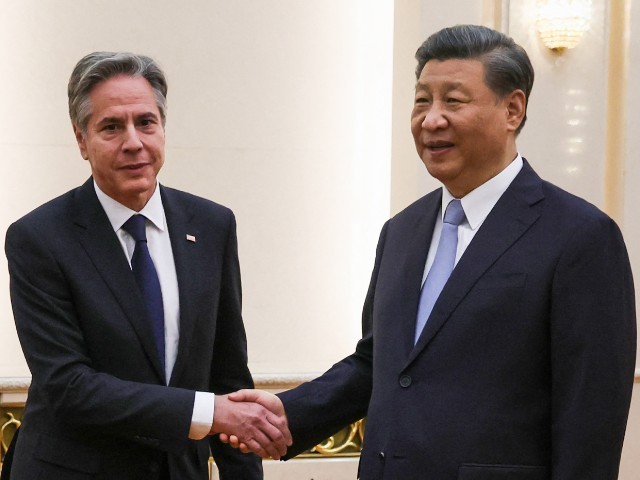
U.S. Secretary of State Antony Blinken shakes hands with China’s President Xi Jinping at the Great Hall of the People in Beijing on June 19, 2023. (LEAH MILLIS/POOL/AFP via Getty Images)
The weird and embarrassing debacle of the Chinese spy balloon that flew across much of the United States made the Biden administration look weak before Beijing’s provocations and also made it look dishonest and high-strung to Americans. As with Biden’s horrendous response to the Kabul airport bombing, the administration freaked out after days of mounting public pressure (and unflattering media coverage), shot the Chinese balloon down — and then fired a salvo of expensive missiles at every other balloon in sight.
During the Biden administration, China has grown increasingly aggressive in the South China Sea. Cybersecurity experts are currently hunting for swarms of malware “time bombs” China reportedly planted in vital U.S. computer systems.
Biden’s inept foreign policy team somehow lost the moral high ground to China on slavery, as China’s aggressive foreign policy team ambushed and destroyed Secretary of State Antony Blinken in a pivotal early encounter in 2021.
Biden is trying to get tougher on China, but even there his moves are clumsy and poorly thought out. For instance, Biden tried to intimidate the Chinese by issuing an executive order banning American investment in certain cutting-edge Chinese companies. He managed to rattle capital markets, but critics noted the executive order was largely theatrical “guidance” that asks U.S. firms to avoid making investments they did not really want to make anyway, given the oppressive behavior of the Chinese government.
China has grown more assertive on the world diplomatic stage, sensing a vacuum created by Biden’s fumbling. One of China’s biggest diplomatic coups was negotiating a rapprochement between longtime regional rivals Saudi Arabia and Iran — an achievement made possible by Biden’s relentless alienation of the Saudis.
Saudi Arabia
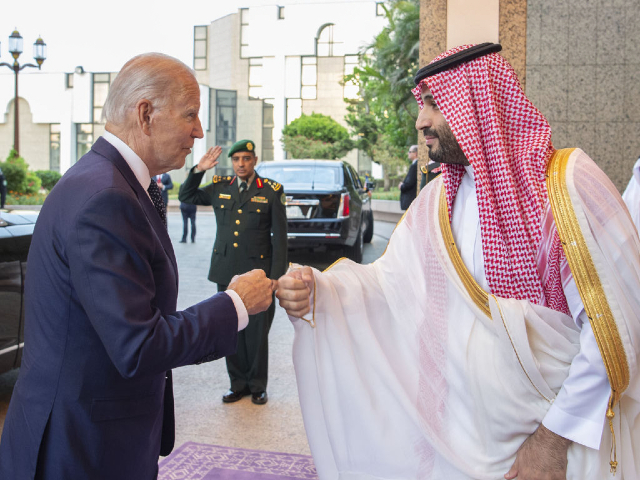
U.S. President Joe Biden being welcomed by Saudi Arabian Crown Prince Mohammed bin Salman at Alsalam Royal Palace in Jeddah, Saudi Arabia, on July 15, 2022. (Photo by Royal Court of Saudi Arabia / Handout/Anadolu Agency via Getty Images)
Biden could not have worked much harder to alienate Saudi Arabia and drive it into China’s ready arms. Biden infamously pledged to make the de facto chief executive of Saudi Arabia, Crown Prince Mohammed bin Salman (MBS), into a global “pariah” during the 2019 Democratic primary.
MBS clearly never forgot that insult, and he decisively defeated Joe Biden in the contest of wills that followed, culminating in Biden’s humiliating pleas for more oil as gas prices soared and American consumers fumed.
The Saudis did not regain their good humor after getting Biden on his knees. The Kingdom has steadily pivoted away from the United States during Biden’s term. At the very least, Riyadh wants Biden — or his successor — to know that the price of convincing it not to complete that pivot will be steep.
Iran
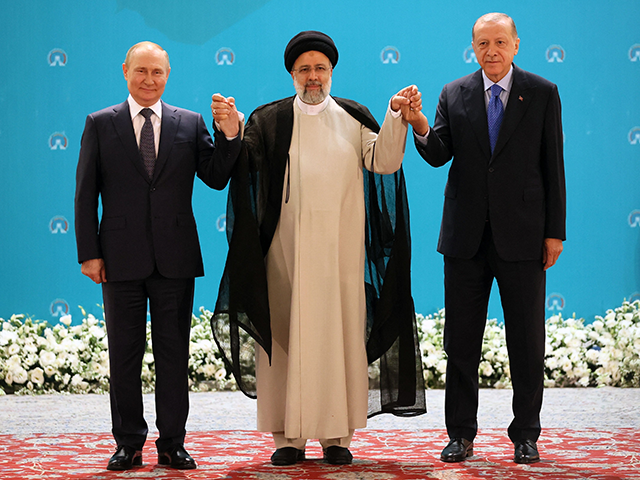
Russian President Vladimir Putin, Iranian President Ebrahim Raisi and Turkish President Recep Tayyip Erdogan pose for a photo before a trilateral meeting on Syria in Tehran on July 19, 2022. (SERGEI SAVOSTYANOV/SPUTNIK/AFP via Getty Images)
Biden clearly came into office hoping to revive his old running mate Barack Obama’s 2015 nuclear deal with Iran, at almost any cost. Iran turned out to be so intransigent, demanding vast unilateral American concessions before it would even take a seat at the bargaining table, that not even Joe Biden could find a way to bring the nuclear deal back.
Last week, the Biden administration launched a bizarre rumor-mill rollout of a plan to give Iran $6 billion in frozen assets in exchange for five long-imprisoned American hostages. Horrified observers fear Biden just set the price of an American hostage at $1.2 billion apiece — and gave Iran a huge pile of money to finance terrorist mayhem across the Middle East.
Biden officials absurdly insisted the ransom payment would be harmless because Iran can only use the money for food and medicine. Iran will, of course, find other things to do with the $6.2 billion it suddenly does not have to spend from its own treasury on food or medicine.
Iran has engaged in increasingly provocative behavior during the Biden years, from piracy in the Persian Gulf to horrific human rights violations. Exasperated by Biden’s refusal to take action against Iranian proxies after drone and missile attacks on civilian targets, some of America’s Gulf allies began looking elsewhere for partners, as with Saudi Arabia and China.
Africa

Supporters of Ibrahim Traore stage a demonstration on October 2, 2022, in Ouagadougou, Burkina Faso. Late on Friday, a group of military officers headed by Army Capt. Ibrahim Traore deposed Damiba, dissolved the transitional government and suspended the constitution. (Stringer/Anadolu Agency via Getty Images)
Instability has rippled across the African continent during Biden’s term, with crises such as the brutal power struggle in Sudan, appalling violence in Ethiopia, and the recent coup in Niger.
A common theme in all of these African disasters is the ebbing of American influence across the continent, while China and Russia have become rising powers. The Biden team was caught flat-footed by the Niger coup and seems equally stunned by its inability to make diplomatic headway with the junta.
One reason for this shift is that China and Russia offer military and economic benefits without pressuring African governments on political reform or human rights, and especially not on gay rights. This is especially evident in Uganda, whose Marxist government passed a harsh anti-LGBT law in May and has defiantly resisted Biden’s threats to punish it.
In December 2022, President Biden gathered African leaders in Washington, handed out billions in U.S. taxpayer funding and private investment, and pledged that his administration was “all-in on Africa’s future.” A few months later, foreign policy analysts were writing about the administration’s desperate attempts to stay in the game while China and Russia run the diplomatic table across the African continent.
North Korea
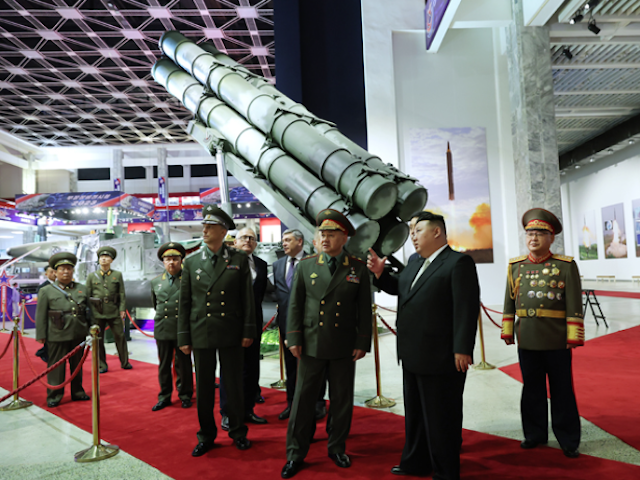
Kim Jong-un and Russian Defense Minister Sergei Shoigu tour a weapons exhibit in Pyongyang, North Korea, June 26, 2023. (Rodong Sinmun/North Korean Government)
Former President Donald Trump took a good deal of heat for first insulting North Korean dictator Kim Jong-un, then offering him an unprecedented diplomatic opening, which came to a disappointing end.
However odd that strategy might have been, there is no question Pyongyang has grown more belligerent and threatening under Joe Biden. Alarming launches of increasingly advanced missiles have resumed. Kim is ordering increased military production and threatening harsh responses to U.S.-South Korean military exercises. The Yongbyon nuclear research reactor is back in business after Kim shut it down in 2018.
Biden seemed to believe North Korea was a problem he could leave on the back burner for a few years, but perhaps at the urging of anxious South Korean leaders, he is taking it seriously again and reminding Kim that nuking either Seoul or the United States would be unacceptable.
A fresh diplomatic crisis bubbled over last month with the strange disappearance of Army Private Travis King, who rushed across the border into North Korea after displaying some erratic behavior. The Biden administration declined to classify King as a prisoner of war last week, even though it has confidence he has been taken into custody by the North Koreans.


